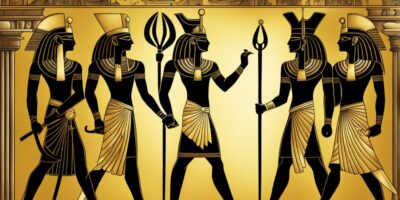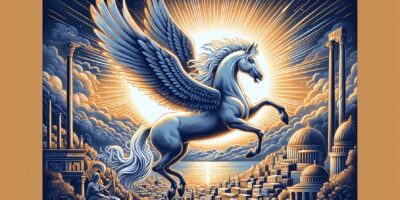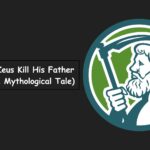Zeus, the almighty ruler of the Olympian gods, holds a prestigious position in Greek mythology. But have you ever wondered why Zeus reigns as the king of the gods? In this article, we’ll unveil 15 compelling points that shed light on why Zeus stands at the pinnacle of divine authority. Get ready to embark on a mythological journey and discover why Zeus is the undisputed sovereign of Mount Olympus!
Point 1: Divine Birthright
Born to Rule: Zeus was born to the Titan Cronus and the Titaness Rhea, making him a direct descendant of the primordial deities. This divine lineage placed Zeus in the prime position to ascend to the throne. The concept of divine birthright was deeply ingrained in Greek mythology and played a crucial role in his kingship.
Succession Mythology: The overthrow of Cronus, who had previously ruled the cosmos, marked a significant shift in power. Zeus’ victory in the Titanomachy, the war between the Titans and the Olympians, solidified his position as the rightful king of the gods.
Cosmic Balance: The Greeks believed in maintaining a cosmic balance, and Zeus’s rise to power was seen as a restoration of order in the universe. This balance and the belief in fate further justified his rule.
Point 2: Supreme Authority
Oathkeeper and Enforcer: Zeus was regarded as the god of oaths and hospitality, and he held the authority to enforce these sacred agreements. This role made him the ultimate arbiter in divine disputes and a symbol of justice. His commitment to upholding oaths and ensuring fairness underscored his supreme authority.
Thunderbolts of Power: Zeus was associated with the thunderbolt, a symbol of his dominion over the skies. The awe-inspiring thunderbolts represented his ability to command the forces of nature and maintain order in the cosmos.
Divine Laws and Protocols: Zeus was responsible for establishing divine laws and protocols that governed the gods’ interactions with mortals. His role as the divine legislator underscored his position as the ultimate authority in the divine realm.
Point 3: Leadership in the Titanomachy
Warrior King: Zeus played a pivotal role in the Titanomachy, leading the Olympian gods against the Titans in a battle for cosmic supremacy. His leadership and strategic prowess in this conflict demonstrated his ability to protect and guide the divine order.
Victor Over Chaos: The Titans represented chaos and anarchy, and their defeat at the hands of Zeus and the Olympians signified the triumph of order and civilization. Zeus’s victory in this epic battle further solidified his kingship.
Protector of the Cosmos: Zeus’s role in the Titanomachy was not just about power but also about ensuring the stability and harmony of the cosmos. His victory established him as the protector of the divine and mortal realms.
Point 4: Oracle at Dodona
Divine Prophecies: Zeus was closely associated with the oracle at Dodona, one of the most ancient and revered oracles in ancient Greece. The oracle delivered prophecies and guidance from Zeus, reinforcing his role as the ultimate source of wisdom and divine knowledge.
Mysterious Oak Tree: At Dodona, an ancient oak tree was sacred to Zeus. The rustling leaves of this tree were believed to convey his will and wisdom to the priestesses of the oracle. This connection to the oracle heightened Zeus’s reputation as the divine communicator.
Divine Counsel: People from all over Greece sought counsel from the oracle at Dodona, and Zeus’s influence over this revered institution affirmed his role as the supreme deity who provided divine guidance and foresight.
Point 5: Father of Gods and Men
Familial Authority: Zeus was often referred to as the “Father of Gods and Men” because of his many divine offspring, both gods and heroes. This title emphasized his role as the patriarch of the divine family and symbolized his authority over the entire pantheon.
Prominent Lineage: Zeus’s children included many notable deities and heroes, such as Athena, Apollo, Artemis, Persephone, and Heracles. His prolific offspring further showcased his influence over the divine world and human affairs.
Protector and Guardian: As the father of both gods and heroes, Zeus played a protective and guardian role over his divine and mortal progeny. This responsibility emphasized his authority and care for his extended family.
Point 6: Supreme Jurisdiction
Divine Judgments: Zeus had the authority to make divine judgments and decisions that affected the gods and mortals alike. He presided over divine trials and delivered verdicts that were binding in the divine and mortal realms.
Moral and Ethical Oversight: Zeus’s judgments often revolved around moral and ethical issues. His decisions helped establish a code of conduct for both gods and mortals, reinforcing his role as the ultimate moral authority.
Fate and Destiny: The Greeks believed in the concept of fate and destiny, and Zeus was seen as the god who controlled the fates of both individuals and nations. This divine oversight over destiny further solidified his jurisdiction.
Point 7: Weather and Natural Forces
Control Over Nature: Zeus was the god of the sky and the weather, making him the deity responsible for controlling natural forces. His ability to unleash storms, rain, and thunder highlighted his power over the natural world.
Harmonizing Nature: The Greeks believed that Zeus used his control over weather to maintain balance and harmony in the world. His role as the weather god emphasized his responsibility in ensuring the orderly progression of seasons and the fertility of the earth.
Cosmic Harmony: By maintaining the balance of nature, Zeus contributed to the overall cosmic harmony, reinforcing his position as the king of the gods who upheld the natural order.
Point 8: The Oracle at Delphi
Delphic Oracle: Zeus was also closely connected to the oracle at Delphi, another prominent oracle in ancient Greece. The oracle served as a conduit for divine communication and was believed to channel Zeus’s wisdom and guidance.
Consulted by Heroes: Many heroes and leaders, such as Oedipus and Croesus, sought advice from the Delphic Oracle. This widespread consultation with the oracle emphasized Zeus’s role as the ultimate source of wisdom and divine counsel.
Spiritual Center: Delphi was considered the spiritual center of the Greek world, and Zeus’s association with this revered site further established him as the supreme deity and source of divine inspiration.
Point 9: Role in Creation
Role in Creation Mythology: Zeus played a pivotal role in the creation of the cosmos and the establishment of divine order. He, along with his siblings, participated in the overthrow of the Titans and the subsequent shaping of the world.
Cosmic Balance: Zeus’s role in creation represented the restoration of cosmic balance and order. His involvement in shaping the world and controlling the forces of nature highlighted his responsibility for maintaining harmony in the universe.
Divine Architect: As a key figure in the creation myth, Zeus was often portrayed as the divine architect who laid the foundations of the cosmos. This portrayal underscored his role as the cosmic ruler.
Point 10: Protection of Guests and Strangers
Hospitality and Xenia: Zeus was the protector of guests and strangers, and the concept of xenia, or hospitality, was central to his domain. He ensured that travelers and guests were treated with kindness and respect, emphasizing his role as a benevolent and just deity.
Social Order: The principles of hospitality were crucial for maintaining social order in ancient Greece. Zeus’s association with this concept showcased his commitment to fostering positive human interactions and promoting ethical behavior.
Guardian of Wanderers: Zeus’s protection of guests and wanderers reinforced his image as a compassionate and watchful deity who cared for the well-being of mortals.
Point 11: Cultural Reverence
Cultural Significance: Zeus held immense cultural significance in ancient Greece. He was celebrated in art, literature, and religious rituals, reflecting the Greeks’ deep reverence for the king of the gods.
Olympian Festivals: Festivals and games held in honor of Zeus, such as the Olympic Games, were of paramount importance. These cultural events reinforced Zeus’s position as a central figure in Greek society.
Moral and Ethical Guidance: Stories and myths about Zeus often conveyed moral and ethical lessons, making him a source of cultural guidance and wisdom.
Point 12: Divine Consorts
Marital Authority: Zeus had several divine consorts, including Hera, the queen of the gods. His marital relationships were symbols of authority and hierarchy within the divine family, highlighting his role as the divine patriarch.
Matrimonial Bonds: Zeus’s marriages served to establish alliances among the gods and reinforce his position as the head of the pantheon. These matrimonial bonds underscored his authority and influence over the divine world.
Family Unity: Despite his many consorts, Zeus’s marital relationships were essential for maintaining family unity among the gods and ensuring that his authority as the king of the gods was recognized.
Point 13: Divine Symbols
Eagle and Aegis: Zeus had distinctive symbols, including the eagle and the aegis (a shield or protective cloak). These symbols represented his power and authority and were often depicted in art and mythology as manifestations of his divine presence.
Lightning Bolt: The lightning bolt, one of Zeus’s most iconic symbols, was a potent representation of his control over the skies and the natural world. Its association with thunder and storms emphasized his dominion over the elements.
Idolatry and Devotion: The use of these symbols in religious practices and worship served as a constant reminder of Zeus’s divine rule and inspired devotion among the ancient Greeks.
Point 14: Cultural Patronage
Patron of Heroes: Zeus was considered the patron of heroes, providing them with divine protection and guidance. His association with heroes and heroism reinforced his position as the divine guardian of those who sought to achieve greatness.
Promotion of Virtues: As the patron of heroes, Zeus encouraged and rewarded virtuous qualities such as bravery, wisdom, and nobility. This promotion of virtuous behavior highlighted his role as a moral authority.
Inspiration for Achievements: The belief in Zeus’s favor motivated individuals to aspire to greatness and undertake heroic endeavors, contributing to the overall cultural reverence for the king of the gods.
Point 15: Universal Worship
Pan-Hellenic Deity: Zeus was one of the few deities universally worshiped across all of ancient Greece. His worship transcended regional and city-state boundaries, emphasizing his position as a deity of supreme importance.
Unifying Influence: Zeus’s widespread worship served as a unifying force among the Greeks, fostering a sense of shared identity and cultural cohesion. This universal reverence for Zeus highlighted his role as a unifying and central figure in Greek religion.
Cult Centers: Numerous cult centers and temples were dedicated to Zeus throughout Greece, reflecting the diversity of his worship and the acknowledgment of his universal authority.
Conclusion
Zeus’s ascendancy to the throne of the gods was the result of a multifaceted tapestry of points that included divine birthright, supreme authority, leadership in the Titanomachy, oracles at Dodona and Delphi, his role as the Father of Gods and Men, and his supreme jurisdiction over divine judgments and fate. Additionally, his dominion over weather and natural forces, creation mythology, protection of guests and strangers, cultural reverence, marital authority, divine symbols, cultural patronage, and universal worship all contributed to his unrivaled position as the king of the gods. Zeus was not only a divine monarch but also a symbol of justice, wisdom, and order in the ancient Greek world.
As you delve into the rich tapestry of Greek mythology, remember that Zeus’s reign was not just a matter of power but a reflection of the values and beliefs that defined the culture of ancient Greece. His legacy endures as a testament to the enduring appeal of his multifaceted character and divine authority.







Leave a Reply